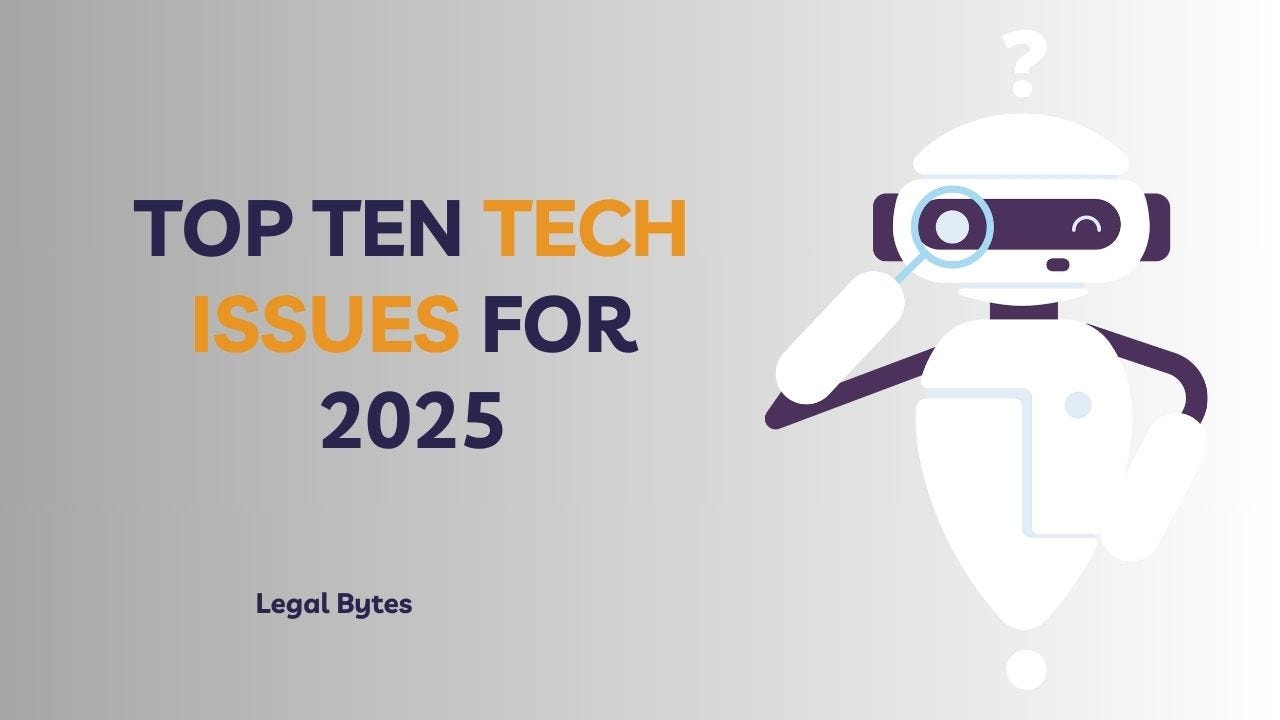TOP 10 TECHNOLOGY ISSUES TO WATCH OUT FOR IN 2025 - and Their Legal Implications
What tech issues should we look out for in 2025 and how does the law affect them?
As we approach 2025, emerging technologies like artificial intelligence, blockchain, and the Internet of Things (IoT) continue to transform industries and daily life. But with these advances come critical legal issues, from data privacy concerns to intellectual property rights and regulatory compliance.
This guide highlights the top 10 technology issues projected to shape 2025, with a deep dive into the legal impacts for businesses, innovators, and consumers.
1. Quantum Computing
Quantum computing uses the properties of quantum mechanics to process information faster than a normal computer. Its processing power promises breakthroughs but threatens current encryption methods because it can crack codes that are currently perceived as secure.
Legal Implications: Governments may introduce regulatory frameworks for quantum computing, especially for data encryption standards. Companies should monitor these developments and prepare to adopt quantum-resistant algorithms to protect sensitive information.
2. 5G Expansion and Connectivity
The widespread rollout of 5G enables the high-speed low-latency connections that most infrastructures need but introduces new cybersecurity vulnerabilities.
Legal Implications: As 5G infrastructure expands, regulatory standards around data protection will tighten. Businesses must secure 5G-enabled devices and networks, adhering to stricter telecom regulations and preventing data breaches.
3. Augmented and Virtual Reality (AR/VR)
AR and VR platforms are becoming mainstream, raising questions about user privacy, safety, and content regulation.
Legal Implications: Expect regulations mandating privacy by design in AR/VR applications. Content moderation policies will also evolve, requiring platforms to manage user behavior and protect minors in virtual environments.
4. Internet of Things (IoT)
IoT devices in homes and workplaces generate vast amounts of data, often with limited security measures.
Legal Implications: IoT regulations are increasingly focusing on data privacy and security. Businesses manufacturing or operating IoT devices must adhere to standards like GDPR and conduct vulnerability assessments to avoid legal liabilities.
5. Blockchain and Cryptocurrencies
Blockchain technology underpins cryptocurrencies, decentralized finance (DeFi), and NFTs, but regulatory ambiguity persists.
Legal Implications: Expect tighter global regulation around cryptocurrencies, particularly regarding anti-money laundering (AML) and taxation. Companies in the crypto space must prepare for compliance with stricter reporting and transparency standards to mitigate financial and legal risks.
6. Cybersecurity
As cyber threats evolve, companies must fortify defenses against ransomware, phishing, and state-sponsored attacks.
Legal Implications: Cybersecurity regulations like the Cyber Crimes Act demand proactive defense measures. Businesses will need robust incident response plans and secure data storage to prevent legal liabilities associated with data breaches.
7. Intellectual Property in the Digital Age
Digital transformation raises complex IP issues, especially with user-generated content, deepfakes, and AI-generated works.
Legal Implications: Patent and copyright laws struggle to keep pace with technology. As AI-generated content becomes more common, expect IP laws to be amended to protect creators and consumers from infringement and misuse.
8. Biometric Data and Surveillance: Privacy and Ethical Dilemmas
Biometric data, from facial recognition to voice recognition, is increasingly used in security and authentication.
Legal Implications: Biometric data collection laws are expanding, with legislation requiring explicit user consent and strict data handling protocols. Companies must implement compliant data storage practices and respect user rights to avoid legal challenges.
9. Synthetic Media
Synthetic media refers to content that is entirely generated by AI, including deepfakes, virtual influencers, and automated video content.
Legal Implications: Several jurisdictions will and have begun to consider enacting laws that specifically regulate the spread of AI-generated content, whether or not such content is prone to harm, without proper acknowledgment of its source.
10. Telemedicine
Telemedicine is quickly expanding and becoming a regular mode of healthcare delivery. It allows patients to consult with doctors via digital platforms, reducing the need for physical visits.
Legal Implications: Many countries have recognized the importance of telemedicine especially for patients in critical conditions. This raises questions of liability, accuracy, bias, and other ethical considerations.
By understanding and addressing these legal implications early, companies can innovate responsibly and remain compliant. Monitoring regulatory developments, implementing best practices, and engaging with legal advisors will be key to leveraging technology in 2025 while mitigating legal risks.
About Legal Bytes
We are Adune Legal’s weekly Newsletter, which simplifies the Law for Busy Executives, Entrepreneurs, and Tech Enthusiasts interested in the legal aspects of Business, Technology, and Intellectual Property.
We love emails from our readers— reply to this email and let us know your thoughts and suggestions.
WAIT!!!
Become a paid subscriber and access;
Q&A sessions with Nneoma Grace via chats on Substack.
Detailed Legal Templates and examples to save you time and legal fees
Expert Interviews and Case Studies
Don't miss out on these perks - subscribe today and start enjoying it!
Thanks for reading Legal Bytes
Adune Legal’s Team
P.S. Like Legal Bytes? Please forward us to a friend.
P.P.S. Was this publication forwarded to you? Sign up here & see previous publications.





